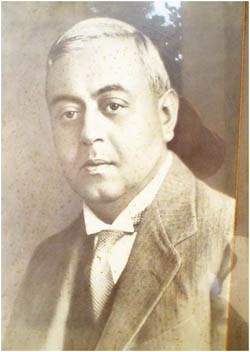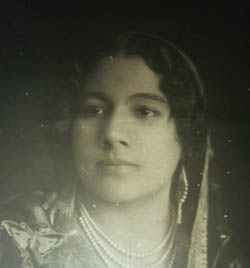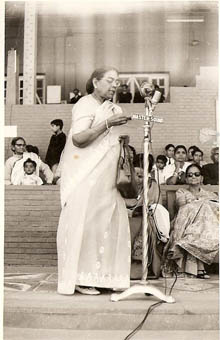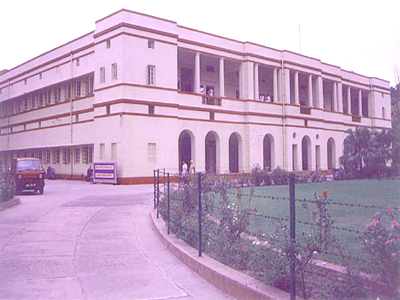| |
 |
 |
About the Founder of Lady Irwin School
Shri Satish Ranjan Das
(Law Member of the Governor General’s Executive Council) |
Shri Satish Ranjan Das was born in a well to do Bengali family on 29th February 1872. He was the second son of Shri Durga Mohan Das. For his schooling, Satish Ranjan Das was sent to England where he studied in a Grammar School in Manchester. Thereafter, he went to the University College in London. He started his career as a Barrister- at-Law at the Middle Temple. He returned to India in 1894 and worked as an advocate in the Calcutta High Court.
In 1905, he married Bonolata, daughter of Shri Bihari Lal Gupta, ICS, CSI. They had two sons.
In 1917 he became a Member of the Standing Council, Government of India. He rose step by step in his profession to become a lawyer of great eminence and made his name in Calcutta. In 1922 he was appointed as the Advocate General of West Bengal. He became a member of Governor General’s Executive Council in 1925.
Two of his publications are ‘A Letter to My Son’ and ‘A New Policy of India’. He enjoyed playing tennis. He was the Treasurer of the Boy Scouts of Bengal and the Lodge of Good Fellowship. He was also a prominent member of the Brahmo Samaj.
|

Shri Satish Ranjan Das

Shrimati Bonolata Das |
Life Sketch Of Late Kamala Sengupta , Principal Lady Irwin School 1944 to 1973
by Mita Majumdar nee Chakravarty Student Lady Irwin School(1950-61) Teacher-1967
Ms. K. Sengupta daughter of Dr. S. Sengupta was born on 20th August,1910. She worked as Vice Principal, Gokhle Memorial Higher Secondary School at Kolkata. Ms. Sengupta joined the Lady Irwin School at Simla in 1944 and retired on24th December,1973 after getting extension in service from 21st August,1970.
All over India four school Principals were selected as field advisors of the All India Council for Seondary Education, set up by the Government of India.She contributed valuable service as field advisor from April 1956 to 1959. This council was fore runner of N.C.E.R.T. and on its recommendation, the N.C.E.R.T. was established.
As field advisor she was mostly in charge of the Council's Examination Reform Programme and organised workshop for training college lecturers and subject teachers for prepration of test material of problem solving type. Organising National and State Seminars for improving Secondary School Education programmes was also her duty. These seminars involved training college lecturers, Principals and subject teachers.
|

Kamala Sengupta |
She received National and State award forTeachers in the year 1967 from the Government of India and Delhi Administration respectively in recognition of her meritorious service for the cause of education. The Governing Body of the Lady Irwin Higher Secondary School ( now Senior Secondary) for girls place on record their deep and grateful appreciation of the services rendered to the school by Ms. K. Sengupta as Principal for nearly three decades.
She served with unflagging devotion till her retiremement. It was due to her high qualities of leadership that she succeeded in building up a team of teachers devoted to the service of the pupils entrusted to their care, in the best academic traditions of our country. the premier postion which this school has attained among the girl's school in Northern India is a tribute not only to Ms. Sengupta's leadership as Principal but also to her constant upholding of the high traditions of the scholastic life and her passionate concern for the maintenance of academic disciplines and standards. On the eve of her retirement from active service, the Governing Body of the school conveyed to her their best wishes for a long happy and active life in the years to come and expressed the hope that her counsel and guidance will continue to be available to the school and its staff on all occasions.
Miss Sengupta was one of the pioneers of the Parent Teacher Cooperation movement in the country. She continued to be Hony. General Secretary of the Delhi Parent Teacher Association till the last day of her life. She was also very actively connected with many educational forums and was member of the Central Board of Secondary Education, New Delhi.
In 1962, she visited London and other European countries to make on-the-spot study of the workings of the Secondary Schools in those countries. Her visit was sponsored by the British Council.
Ms Sengupta was also associated with several other organisations like :
1. South Delhi Literacy Unit of Bharatiya Gramin Mahila Samiti - Supervisor
2. Child Guidance Society - as member
3. Bengal Association - as Vice President
4. Vinay Nagar Bengali Hr Sec School - as President
5. Education Forum as member
I have remained in the warmth of her personality for 14 years, first as a student for 11 years, and then as a teacher for 3 years. Whatever are my achievements today, I owe them to the values I could build up during my stay in Miss Sengupta's Lady Irwin School.
She would not allow for short cuts. When certain things annoyed her - there was no pretension about that, she made sure that all of us understood. Same was true when she was joyous or happy, her beaming face flashed a big smile often bursting into boisterous laughter- so infectious that nobody could remain unaffected. Even when she was confused about some matter, she lost no time in getting things cleared up. She would send for us (this situation I have faced as a teacher) ask for an explanation, get annoyed maybe, but thrash it out and come to a decision. In a peculiar manner difficult to understand, sha was so much with us, each one of us, and yet - so much above us!
|
|
| From the Question Hour of the Legislative Assembly |
Topic: Fees charged by the Lady Irwin School for Girls in Simla.
Mr. Gaya Prasad Singh: (a) Is it a fact that an Indian Girls’ school has been opened in Simla, which is in receipt of Government grant?
(b) Is it a fact that a rule has been made, or is about to be made, whereby each child of a non-official servant will have to pay one rupee more than the child of a Government servant? If so why this invidious differentiation?
Mr. A.R. Dalal: (a) Yes. The fee income of the school amounted to over Rs. 1500 up to the end of June 1927. The Government of India has sanctioned a grant in aid to the school to the extent of Rs.7, 700 in 1927-1928 and of Rs. 5,700 in subsequent years. It is subject to reconsideration after three years.
(b) One of the conditions of the Government grant is that the pupils who are children of, or under the guardianship, of employees of the Government of India, should be charged fees which are less by 33.3% than those charged from other pupils. The reason for this fee concession is that the school is intended primarily for the benefit of the female children of the Government of India employees. It is not the intention of the Government of India to assist in the maintenance of a school, which is mainly; attended by girls whose education is the concern of the Local Government. |
|
 he
Beginning he
Beginning |
The
Lady Irwin School for Girls was established in 1927, under the leadership
of late Shri S. R. Das, the Law Member of the Viceroy's Executive
Council, for the purpose of making quality education available under
the same roof to all the children of Central Government servants,
irrespective of their status. This welcoming dream of Shri Das in
the service of children was fostered and nurtured by many more 每
a galaxy of Educationists and the school kept expanding till 1947
when it proved itself to be an integral part of the community. It
absorbed more than it had on its rolls and its student strength
galloped from 400 to 1400. |
 |
Originally the school was directly under the administrative control
the Ministry of Education, Government of India and received grant
from the Central Government. Later it was transferred to the Delhi
Administration in 1949. It is a composite School housed in three
separate buildings viz. Primary at Defence Colony and Middle and
Secondary at Canning Road, New Delhi.
There are about 3200 students in the school and team of 120 dedicated
staff members. The results of the school at the Board's Examination
as well as in Class to class promotion is cent per cent. The School
has the following distinctive features.
• Collecting innumerable honors in Debates, Speeches,
Recitations, Paintings and Essay competitions.
• Bagging prizes in Inter School Sports and Athletics meet.
The record worth mentioning is that for fifteen consecutive years
it once retained the championship.
To know the Lady Irwin School one must know the following:-
• The high aspirations of the Institutions;
• The steady pace of its growth and success in all spheres;
• The solidarity of its human force giving it a firm footing
higher;
• The enthusiasm existing through all time of one and all,
and their devotion to duty;
Finally, the commitment to the idea of bringing within the reach
of the middle income group, type of education, which hitherto, only
the more fortunate could give their children in public schools.
|
 HE
SCHOOL GYMNASIUM 每 AN OBJECT OF PRIDE HE
SCHOOL GYMNASIUM 每 AN OBJECT OF PRIDE |
| If
only the walls of the Gym could speak! They enjoy the envious position
of coming in the closest contact with the spirit of children. They
hear Hindi, Bengali and English too 每 said in Prose and Poetry 每
recited, sung and delivered with great eloquence in Dramas. They
hear the music of drums, the notes of the piano, the harmonium,
and the tingle of bells from anklets of dancing children. They are
transported to the different parts of the country through pantomimes.
They shuttle between centuries and jump hop from decade, forward,
backward. Such are the activities that go on in the Gym 每Inter House
competitors in Education and Plays, Cultural programmes etc. the
most recent exciting event is preparation for the Republic Day Celebration.
The School participating for the 5 th year in succession. This is
the only school that participates out of sheer enthusiasm and not
for a prize for three consecutive years the items are original to
the core and the songs are composed by the School. |
 OME
ROOMS OME
ROOMS |
The
whole School is divided vertically into Six Houses and each House,
into as many Home-Rooms as there are teachers in the House. Here
the teacher and students behave like family members. The same teacher
is in charge of a Home-room for a period of three years. The Home
room teacher, therefore, comes, close to the children and is able
to detect special aptitudes of her group and is able to solve the
problems a child faces in the school and strengthen her strong points. |
 OOPERATION OOPERATION
|
The
School has an active Parent Teacher Association and parents through
the Association are rendering invaluable help to the School in carrying
out its varied programmes successfully.
The School is today what it is because of the cooperation
of the concerned 每 the Parents, the Staff, the Managing Committee
of the School and particularly due to the guidance of the Directorate
of Education, Delhi . It is virtually thriving on GOODWILL from
all quarters. |
 THE
GOAL OF THE SCHOOL IS THREE – FOLD THE
GOAL OF THE SCHOOL IS THREE – FOLD |
Firstly
it is to increase the children’s mental alacrity, which includes
imagination and reasoning, responsiveness to both ideas and environment
and sensitivity to the finer things of life. In other words, the
objective is to create in the students an urge to know more and
more about the world, about people and life itself through books,
vicarious experiences living in imagination with characters in biographies
and fiction, by joining in their hopes, fears and disappointments
under varying circumstances. This way one grows richer, one develops
new powers of enjoyment and one can penetrate into new areas of
understanding.
The second aim is to help students to identify
themselves with others in the family, in the School and in the society,
with its ever widening boundaries, including people of all income
groups, varying qualifications and different religion, caste and
creed. Children should be proud of the different groups they belong
to and to realize their identity as human beings binding them to
the rest of mankind.
The third goal is to inculcate in them the value
of strife and labour both singly and cooperatively. Children must
know that work that is well planned and objective-based and also
enjoyable reaps the maximum harvest. In other words, in such work
the head, the hearts and the hands or limbs work as if in a team,
one reinforcing the other. In group-work the students soon learn
that respect for the individual and sense of humour help to get
Herculean tasks done happily and effectively. |
| |
 O
MY COLLEAGUES O
MY COLLEAGUES
 emember : emember :
|
The
business of the teacher is not merely or primarily to pass on to
his public such knowledge as he happens to possess but so to quicken
their spirit that during years of work and of leisure they may be
able to live with understanding, with honesty and with delight.
A School functions to internalise in its pupils
both the commitment and capacities for successful performance of
future roles:
a) Commitment to the implementation
of the broad values of society.
b) Commitment to the performance of a specific
type of role within the structure of society.
A well-adjusted child implies a child who faces
life with confidence and who makes his social contacts happily.
In this connection Reaves has said:
“This High School age is commonly regarded
as a period of great importance in the life of the youth, because
of the adjustment which must be made. Problems that have to do with
the intellectual and physical development, choice of companions,
social activities and the formation of right social attitude must
be met and solved.
In fact, the man who is truly educated is not just
a learned man, but a man of a poised and balance personality. The
habits of thought, feeling and action which a child is forming from
the first weeks of life and through childhood and youth are as much
a part of his education as the subjects he learns at school.
Honesty, truthfulness, sense of duty and responsibility,
courage to face life as it is - these are some of the indispensable
qualities a child must posses. These are much more important than
mere book-knowledge. Just to cite an example, however ridiculous
it may sound: a child possessing these traits of character can be
forgiven even if he happens to say ‘Rome is on Ganga’.
The geographical position of Rome can be learnt in a few minutes
but character cannot be built in a day. |
| |
|
|








